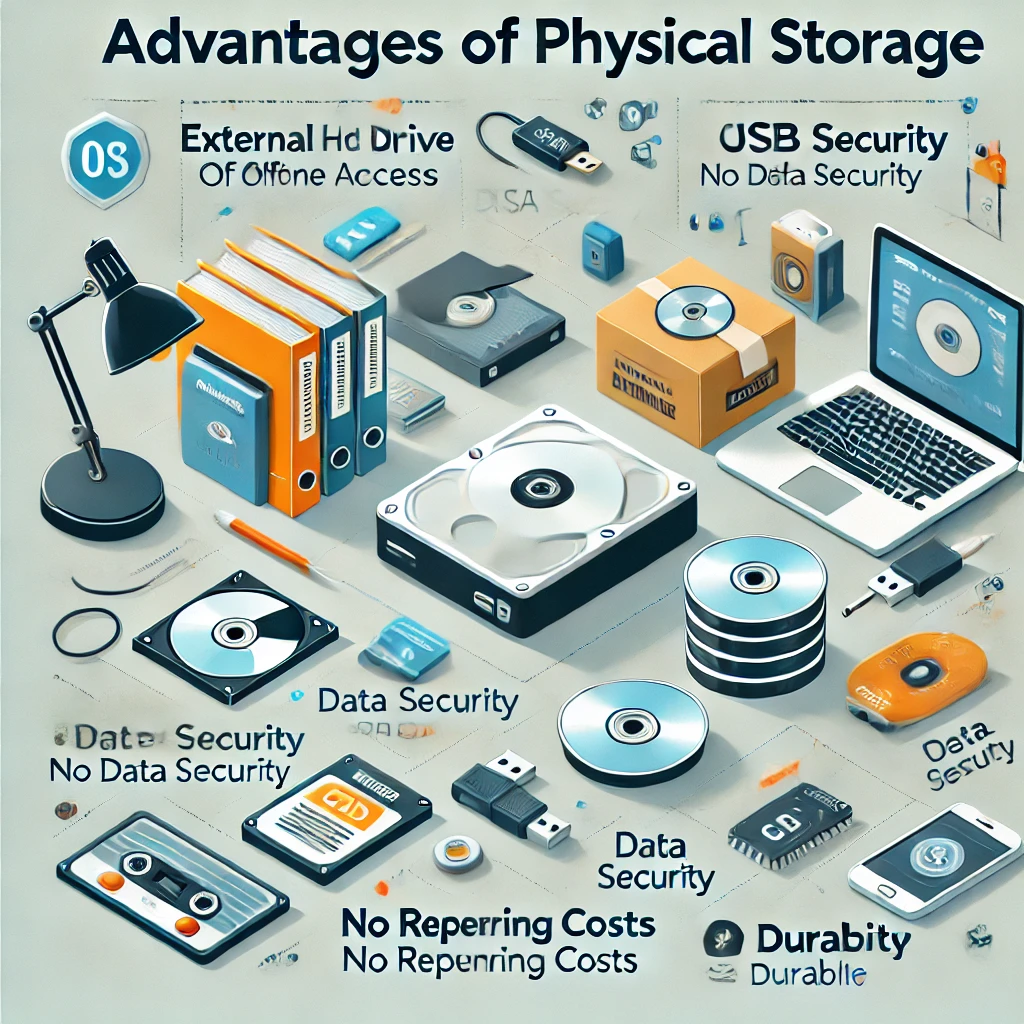Cloud vs Physical Storage Which is Better for You?

Introduction
Data storage has become essential in today’s digital world. With the vast amount of photos, documents, videos, and files we accumulate, finding a reliable and safe place to store it all is more crucial than ever. But when it comes to choosing between cloud storage and physical storage, which option is better for your needs? Let’s explore the ins and outs of both to help you decide.
What is Physical Storage?
Physical storage refers to any device you own and use to store your data locally. This can include hard drives (HDDs), solid-state drives (SSDs), USB flash drives, and even CDs or DVDs. These devices allow you to store data directly on a physical medium, which can then be connected to your computer or other devices as needed.
Advantages of Physical Storage
Total Ownership and Control
With physical storage, you have complete control over where and how your data is stored. There’s no need to rely on external servers or third-party providers, giving you full ownership over your data.
Offline Access and Increased Security
Physical storage doesn’t require an internet connection, so you can access your files anytime, anywhere. Additionally, since your data isn’t stored on an external server, physical storage is generally more secure from potential online threats.
Long-Term Durability and Reliability
High-quality physical storage devices can last for many years with proper maintenance, allowing for secure, long-term data storage.

Drawbacks of Physical Storage
Risk of Damage and Loss
Physical devices are susceptible to physical damage, loss, or theft. A spilled coffee or accidental drop could mean the end of your storage device—and all the data on it.
Storage Limitations and Costs
Physical storage is limited by the device’s capacity. If you need more space, you’ll need to buy additional storage devices, which can become costly over time.
Need for Regular Maintenance and Backups
Physical storage requires regular maintenance, including data backups, to avoid data loss. Physical devices also degrade over time, making data loss a potential risk if not managed carefully.
What is Cloud Storage?
Cloud storage involves storing your data on remote servers managed by a third-party provider, such as Google Drive, Dropbox, or iCloud. These servers are accessible over the internet, allowing you to access your data from virtually any device.
Advantages of Cloud Storage
Accessibility from Anywhere
With cloud storage, you can access your data from anywhere with an internet connection, making it ideal for people who need to work on the go or collaborate with others online.
Scalability and Flexible Storage Options
Cloud storage offers flexible storage plans that can scale with your needs, allowing you to increase or decrease your storage space without having to buy new hardware.
Cost-Effective, Especially for Smaller Storage Needs
Cloud storage often provides a certain amount of free storage, with options to upgrade for a reasonable monthly or annual fee, which can be more cost-effective than purchasing multiple physical drives.
![]()
Drawbacks of Cloud Storage
Dependency on Internet Connectivity
If you don’t have internet access, you can’t access your cloud-stored data. This limitation can be inconvenient if you need to retrieve files in areas with poor connectivity.
Potential Security Concerns
While cloud providers invest heavily in security, the risk of data breaches remains. Storing data in the cloud involves trusting a third party with your information, which can raise privacy concerns for some users.
Ongoing Subscription Costs
Unlike physical storage, which requires a one-time purchase, cloud storage often involves ongoing subscription fees, which can add up over time, especially if you need a large amount of storage.
Comparing Cloud and Physical Storage: Key Factors to Consider
Security
Physical storage offers a level of security that isn’t dependent on the internet, making it a safer option in terms of protection against cyber threats. Cloud storage, however, offers advanced encryption and backup features that physical storage may lack. Each has strengths depending on your security needs.
Accessibility and Convenience
Cloud storage wins in terms of accessibility since it can be accessed from almost anywhere with an internet connection. Physical storage, while reliable offline, can be restrictive for users who need to access files across multiple devices.
Cost-Effectiveness
Physical storage may be more cost-effective for users who require a significant amount of storage and want to avoid ongoing subscription fees. However, cloud storage offers more flexibility and scalability, particularly for users who need only a moderate amount of storage.
Capacity and Scalability
Cloud storage is ideal for users who need scalable storage that can grow with them. Physical storage, on the other hand, can be restrictive in terms of capacity, often requiring users to purchase new devices when they run out of space.
Environmental Impact
Physical storage devices contribute to e-waste and require energy to manufacture. Cloud storage, while eliminating physical waste, depends on large data centers with significant energy consumption. Evaluating the sustainability of each depends on your environmental priorities.
![]()
Choosing the Right Storage Solution for You
To choose the best storage solution, assess your needs. If security, offline access, and long-term durability are top priorities, physical storage might be the right choice. But if you value accessibility, scalability, and cost-effectiveness, cloud storage could be better. Ultimately, the choice depends on your lifestyle, budget, and personal preferences.
Combining Both: A Hybrid Approach
Many users find that combining cloud and physical storage offers the best of both worlds. By keeping essential files on a physical device and using cloud storage for backups or less sensitive data, you can maximize security, accessibility, and convenience.
Conclusion
Choosing between cloud and physical storage depends on various factors, including security, convenience, cost, and environmental impact. Each has its pros and cons, so consider your storage needs carefully to determine which solution best fits your lifestyle.
FAQs
- Can I use both cloud and physical storage at the same time?
- Yes! Using both can offer enhanced security and flexibility.
- Which is safer, cloud storage or physical storage?
- Both have security strengths. Physical storage is generally safer offline, while cloud storage offers advanced encryption.
- How much does cloud storage typically cost?
- Costs vary by provider and plan, with free options up to premium subscriptions for large storage.
- Are there any hidden costs with physical storage?
- Additional costs may include maintenance, repairs, and replacements over time.
- Is cloud storage environmentally friendly?
- Cloud storage eliminates physical waste, but data centers still consume energy. Its eco-friendliness depends on the provider’s sustainability practices.





Informative